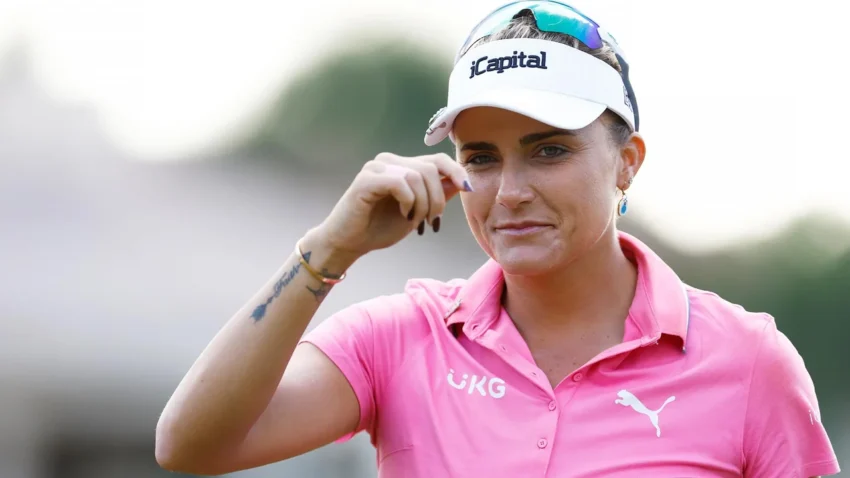Lexi Thompson’s surprising retirement came with a heart-wrenching reason.
GETTY IMAGES
LANCASTER, Pa. — On Tuesday at the U.S. Women’s Open as with most days, the crowd stared at Lexi Thompson.
And on Tuesday as with most days, Lexi stared right back.
“Lexi! LEXI!!!” they yelled, one after the next, a never-ending stream of souvenir flags and selfie requests testing the limits of the ropeline, little arms poking through like little bayonets, each pointed square at Thompson’s chest. Every autograph signed and photo taken spawned another three, and before long the crowd began to feel less like a group of individuals and more like a steadily growing, amorphous blob of wanting. But it did not matter. For a few moments, Lexi wanted, too — not the crowd’s attention or admiration, but to break the bubble between her world and theirs.
And so she did.
If there is a way the crowds will remember Thompson, it is for her patience. Patience that has allowed her to host thousands of autograph sessions like this one throughout a 17-year competitive career, which she announced Tuesday will conclude at end of this season. Patience that has allowed her to connect with tens of thousands of people outside of the ropes, many of them young women, with a small gesture of goodwill. And patience that has allowed her to do all of these things even in the wake of some of the golf world’s most unimaginable lows — lows that she addressed for the first time during a press conference announcing her retirement on U.S. Women’s Open Tuesday.
“Being out here can be a lot,” she said through tears. “It can be lonely. Sorry if I get emotional. I said I wasn’t going to.
I still remember the first time I witnessed Lexi’s gift for patience. It was at the 2022 U.S. Women’s Open at Pine Needles, minutes after Thompson had fallen short again on the biggest stage in the women’s game, finishing T20 in a bid to undo the previous year’s collapse. She signed autographs for close to 30 minutes then, tears streaming down her face, stopping only once each of the girls inside the child-only area had received her attention. I remember the most recent time I’d witnessed it, too, at the Solheim Cup in Spain last September. Another devastating defeat, more tears, and one more similarity: a few dozen young girls who departed with autographs and smiles.
Those scenes felt remarkable at the time and this one, Tuesday morning, felt remarkable too, given Thompson was announcing her decision to retire from a “full-time playing schedule.” She’s a baby by professional golf standards, just 29 years old in a sport where many players don’t hit their primes until well into their 30s. But she’s an ancient 29 by life experience, 17 years into a career that has brought her fabulous wealth and, on more than one occasion, unfathomable heartbreak.
Sometimes the weight of a golf career can be measured not in wins, losses and injuries, but in scars, and as Lexi opened up on “years” of struggles on Tuesday afternoon, it was clear the latter eventually proved crippling.
“I just think, especially with what’s happened in golf, as of recently, too, a lot of people don’t realize what we go through as a professional athlete,” Thompson said. “I’ll be the last one to say, throw me a pity party. That’s the last thing I want. We’re doing what we love. We’re trying the best every single day. You know, we’re not perfect. We’re humans. Words hurt. It’s hard to overcome sometimes.”
Lexi’s humanity has never been cause for debate; the examples of her flawed brilliance are too many to count. There were the back-nine collapses at the ’21 U.S. Open at Olympic and the ’22 Women’s PGA, the lengthy leave of absence at the height of her powers for reasons related to mental health, and who could forget the TV-viewer controversy at the 2017 ANA Inspiration that cost her the tournament, later altering the rules of golf?
But humanity also comes at a price. For all her affection among the fans, Lexi has had an embattled relationship with the public. She has earned a reputation among the press for avoiding questions after her biggest setbacks, and even Tuesday’s retirement “letter” featured a reference to what she called an “unfair” career. While her biggest moments have revealed her to be fallible, her quiet moments have led some to accuse her of being fragile, or worse, lacking accountability. On Tuesday, though, Thompson’s retirement presser featured none of those qualities.
“I might not have a huge friend group, but to have the people that matter the most around me have gotten me through some really hard times,” she said. “I think it’s a lot for everyone out here or in any professional sport. A lot of people don’t know what we go through. The amount of training and hard work that we put ourselves through, it’s a lot. I think we deserve a lot more credit than what we get.”
Perhaps those were the words of a player who’s come to grips with her own golfing mortality. Or perhaps they were the words of someone who, after 17 formative years in the golf fishbowl, has realized that life continues after the competitive heartbreak stops.
“The hardest moment of my career was like a blessing because it was just I learned so much and I gained fans that I never thought I would have,” she said at the end of her press conference, welling up again as she recalled disaster at the ANA. “I’m not going to sit here and say that moment didn’t hurt. It still does, but it’s part of a career.”
As her Tuesday practice round reached its conclusion, Thompson stared out into the crowd. Her parents had funneled into the back of the green with her dog in tow. Legions of her fellow competitors cooed praises from the practice range just feet away, while a crowd waited for her with near-unanimous excitement.
If this was the culmination of her career, Lexi Thompson seemed happy. She had spent a lifetime searching for something, and it turned out she’d had it all along.
It was right there on the other side of the ropes, staring her straight in the face.
Related

